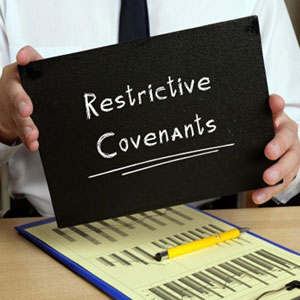 As a business owner, protecting your company, trade secrets, and intellectual property are of utmost importance. Unfortunately, many of these risks are posed by your own employees who have confidential knowledge and information about your company.
As a business owner, protecting your company, trade secrets, and intellectual property are of utmost importance. Unfortunately, many of these risks are posed by your own employees who have confidential knowledge and information about your company.
So how can you protect your business and ensure that proprietary information is kept secure – while still hiring the people you need to run your business? One answer can be found in restrictive covenants. Keep reading this article to discover:
A restrictive covenant is a fairly generic term that encompasses a number of different items that are frequently included in employment contracts. This can include non-compete, confidentiality, and non-solicitation clauses. These clauses limit the employee’s ability to seek competing employment after they leave your company.
They can also limit y a former employee’s ability, after they leave, to solicit your company’s current employees – sometimes called poaching. In addition, they can also govern the nature and extent of any dissemination of confidential information.
Confidentiality provisions can include language that will restrict your or your employees’ activities, both during and after the employment ends. As the name suggests, it requires confidentiality of certain information, such as a trade secret or otherwise proprietary information. The confidentiality agreement limits how an employee may be permitted to disseminate that information.
Non-compete agreements also can impact your employment while you are employed and after you are employed. Non-compete agreements are usually very carefully scrutinized, and they can prohibit employees from seeking competing employment with another company while they’re employed.
They can also restrict your future employment when you leave your current company. For example, if you are making widgets with your current employer, you usually can’t go start making widgets for the competing company down the street.
Non-solicitation agreements generally apply post-employment. They restrict your ability to solicit your previous colleagues if you leave your company and work elsewhere. They are sometimes called non-poaching provisions. These can also be an agreement that prohibits you from soliciting former clients or customers that you worked with at your previous job.
Because a restrictive covenant is a contract, breach of contract remedies are generally available if you have an employee who breaches a restrictive covenant. These can include monetary damages or injunctive relief.
Monetary damages, as the name suggests, are financial damages to compensate the employer for the breach of the covenant. Injunctive relief is an affirmative action taken by the court to prohibit, restrict, or stop any further violation of the restrictive covenant from taking place.
Generally, restrictive covenants can be very difficult to enforce, especially if they are drafted too broadly. Restrictive covenants should be drafted by an experienced attorney to with the least restrictive language possible to achieve the goals that they are seeking to achieve. Courts usually will not enforce your contracts if it is overly broad in time or scope.
Employment agreements can take many different forms and have many different levels of complexity depending on the nature of the job. For example, if you are drafting an executive contract, it will be far different in scope and length than contracts for other employees.
Across the board, however, employment contracts generally dictate the terms of employment and compensation, which can include salary, bonuses, and benefits. Frequently, employment contracts also include various restrictive covenants including confidentiality and non-compete clauses.
The most common place that restrictive covenants are found is within an employment agreement or included in an onboarding packet of documents when the employee is hired. However, we work closely with you to make sure that there is adequate consideration for the restrictive covenant and the non-compete clauses to be enforceable.
The two largest factors that determine the enforceability of a non-compete are time and scope. There must be some limitations within your restrictions. You cannot restrict someone from working in an industry into perpetuity, and you cannot restrict someone generally from working anywhere in the United States, for example.
For your non-compete clause to be enforceable, it must state the least restrictive means possible to accomplish your goals and protect the interests of your company. The time and the scope need to be carefully considered and limited in order for your non-compete clause to be enforceable.
The law changes and evolves frequently. Our firm monitors the current state of the law, both in Illinois and around the country, to ensure that you are receiving the best advice we can possibly give you. Typically, we review our client’s contracts at least every two years to ensure that they are indeed compliant with existing laws.
For more information on Restrictive Covenants In Business, a free initial consultation is your next best step. Get the information and legal answers you are seeking by calling (630) 601-7170 today.

Contact Donnelly Law LLC for the experienced legal support
you need for your business or personal injury case in the
Chicago area. Call Us Now (630) 601-7170